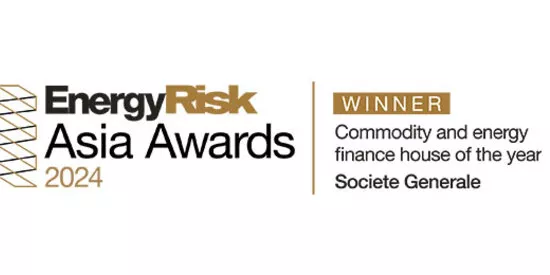
Societe Generale supporting the real economy and new asset classes
Societe Generale has bold plans for developing niche areas in the Australian securitisation market, including equipment, SME and consumer lending. The bank’s Hong Kong-based head of asset-backed products, APAC, Florence Coeroli, and Sydney-based head of asset-backed products, Australia, Arkady Lippa, discuss the strategy and product solutions.
Societe Generale (SG) is a very significant player in global securitisation markets. What expertise does the bank bring to Australia?
Coeroli: SG is very active in securitisation and asset-backed products across the securitisation chain. We have well-established US and European franchises, where we are in top league-table positions. In APAC, we are building a platform on the back of our global leadership position.
Securitisation is one of the bank’s core financing franchises so it is important for us to become more active in the region – especially in Australia, where we think our expertise in other jurisdictions could be relevant to local clients and offshore investors.
Lippa: The structuring expertise for asset-backed products within SG is deep and broad across jurisdictions and asset classes, but particularly for those in which SG is a global leader. We understand key aspects and risks involved in structuring and distributing asset classes such as equipment financing, SMEs, consumer lending and insurance-premium funding.
We also have extensive expertise in trade receivables, which is one of the larger parts of SG’s global asset-backed business. Our European trade-receivables programmes often include Australian assets, so this is a core expertise we are rolling out in Australia.
Another key part of SG’s Australian business is its global ABS [asset-backed securities] distribution. We have an embedded, specialised sales function within the asset-backed business, which has salespeople who know the market landscape and are dedicated to the product. They can answer investor questions around structure and offer a range of investor solutions including financing, which is a great value-add for the client.
Coeroli: Our securitisation business is focused on the full value chain of the asset class. We are here for clients on primary issuance and warehouse facilities, as well as distribution. We also have trading, market-making, sales and repo-financing capabilities. Our business is a one-stop shop for securitisation including borrower and investor clients.
What are the key Australian market trends and opportunities SG wants to tap into?
Lippa: A key global and Australian trend is regulation. The regulatory landscape is evolving all the time and this affects both sides of banks’ balance sheets.
We are very active in capital management for SG itself and for banks globally. It is an area on which Australian banks are very focused and can benefit from. They are looking for solutions that work from a regulatory perspective and are economically sound. Banks need access to technology that enables transfer of risk and balance-sheet management, and we can use our expertise to find these solutions.
Another trend in Australia that continues to grow is the inflow of significant offshore private-equity capital. This is combining with the regulatory trend and is resulting in a lot of M&A activity, as local banks seek to optimise and reshape their operations in Australia and New Zealand.
Coeroli: ESG [environmental, social and governance] is another fundamental market trend. This has been embedded within SG’s financing practice for several years and is becoming more relevant in securitisation. We want to raise awareness on the topic because we think securitisation can play a big part in helping our clients on their ESG journeys, and in achieving green and social ambitions.
How can Australia benefit from global trends?
Coeroli: We are looking at the asset classes we have developed in other jurisdictions and considering whether they are relevant for Australian securitisation issuers. We recently closed a couple of social securitisations in North Asia, where the proceeds were dedicated to access to financing for low- and moderate- income populations. Social securitisation is a new asset class we want to push further.
We are proud to be innovative in this space. We are focused not only on the ‘E’ of ESG but also at what can be meaningful and relevant in the social area. We have seen huge development of social bonds during the pandemic and this can make a lot of sense in securitisation as well.
The Australian securitisation market has a lot of experienced issuers and investors, and they are often interested in pushing the boundaries and being innovative. This is not just for the purpose of doing something new but to do something meaningful.
The social securitisations we were a part of are backed by credit receivables, but I think many underlying asset classes could be acceptable for this type of social issuance. The key is to work with the client to define what could be a meaningful and relevant social project.
It is important for us to be at the forefront of this innovation. We have been active in sectors such as renewables and other green financing for decades, and we want to contribute to social financing too.
Lippa: SME lending is an interesting asset class in this regard. SMEs are the largest employer in Australia, so providing lending to SMEs is clearly a significant engine in the economy. Securitisation, and potentially social securitisation, could be an effective financing tool to help close the funding gap in this sector.
How is SG seeking to develop the local market for assets like SME, consumer and auto lending?
Lippa: SME lending is a key sector for us in Australia and Europe, where we have a long history of supporting private and public SME ABS transactions. We have worked with the European Investment Fund, which previously ran programmes to support market development, and we have been strong supporters of the Australian Office of Financial Management’s Australian Business Securitisation Fund (ABSF).
We worked alongside Judo Bank on its initial ABSF proposal (see the box below). Judo, along with several other challenger loan securitisers, have now been around for some years, so it is an asset class that is gaining momentum.
In auto and equipment ABS, a significant amount of global sponsor and private-equity activity is happening in Australia, including among existing players like Pepper and Latitude but also with divestments from banks selling large portfolios of auto and equipment assets. This is a large part of the lending market that will continue to come into the public markets and SG has strong expertise in this sector, globally and locally.
Judo Bank was established in 2016 as a purpose-built, SME- focused bank to challenge the Australian major banks. Judo has grown its lending book to more than A$3 billion (US$2.3 billion), and since becoming an authorised deposit-taking institution in 2019 has grown deposits to in excess of A$2 billion. To do this it has required innovative funding solutions, which Societe Generale (SG) has helped facilitate. SG and Judo’s partnership began in 2019 ahead of the first round of the Australian Office of Financial Management (AOFM)’s Australian Business Securitisation Fund (ABSF) investment, to which Judo Bank intended to submit a proposal for investment. The ABSF is designed to help develop a wholesale funding market for SME securitisation. Michael Heath, treasurer at Judo in Melbourne, says SG helped develop a structure that suited the interests of all parties. “The warehouse structure SG helped put together met the needs of Judo to further diversify and add to its committed funding sources across multiple tenors. The terms also provide flexibility to cater for the bespoke nature of the SME asset class, while addressing the AOFM’s credit criteria and ABSF’s market development goals.” The structure includes two- and four-year availability periods for the senior tranches, in which the ABSF invested A$250 million in April 2020. SG was arranger for the ABSF transaction and is also a senior financier in the warehouse. “SG has been constructive in structuring and finding a good balance between all parties. This warehouse is one of the cornerstones of our secured-funding programme and allows us to grow with confidence through the COVID-19 period and beyond,” Heath explains. |
How much demand for Australian assets is there from international investors?
Lippa: Offshore investor support for Australian RMBS [residential mortgage-backed securities] and ABS has been steadily growing, in senior and mezzanine tranches, for years. We expect this to continue.
We have seen new investors coming into RMBS and ABS deals over the last 24 months, including some large accounts that had not bought Australian dollar product at all in the past. We are seeing German and French names in books, as well as investors from the US through European funds and even some from smaller European countries like Latvia.
Japan has historically been a big supporter of Australian product, starting with RMBS but now venturing into ABS as well. We would like to see a similar trend in other Asian markets. This demand needs to be supported to develop, such as through continuous education and marketing, secondary-market support and perhaps with repo financing attached to match yield targets for investors.
The article was first published in Australian Securitisation Journal, Issue 20_2021.
Download the article in PDF

China finds its feet: economic stability and gradual recovery in 2025
By Wei Yao, Head of Research and Chief Economist for APAC at Societe Generale.

Best of both worlds: How social ABS delivers low-cost financing and a positive impact
By Eugene Kim, Head of Securitisation and Fund Finance for Asia Pacific at Societe Generale.

Data centres are taking Asia-Pacific by storm
By Marie Vinnell, Chief Country Officer for Australia and Eugene Tan, Head of Technology, Media and Telecoms for Asia...

Societe Generale wins 10 awards in sustainable finance
Global Finance has announced the winners of its fifth annual Sustainable Finance Awards for 2025 and the selections for...



